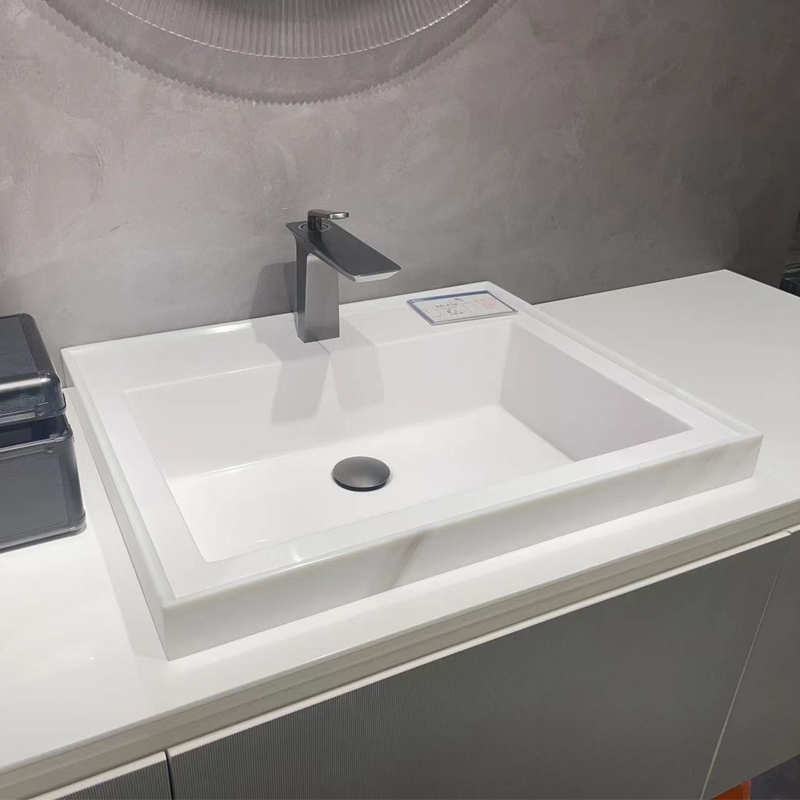
Engineered Stone Sinks, also known as composite stone sinks, are premium fixtures manufactured from a blend of natural quartz crystals (93-95% by weight) and high-performance polymer resins (5-7%). These materials are combined under intense pressure (2,500-3,000 psi) and vibration to create a non-porous, homogeneous structure with superior performance characteristics compared to natural stone alternatives.
The manufacturing process involves precise engineering to achieve a material density of 2.4-2.5 g/cm³, resulting in sinks that combine the aesthetic appeal of natural stone with enhanced durability and functionality.

Engineered stone sinks boast remarkable structural integrity with a Mohs hardness rating of 7 (compared to granite's 6-6.5), making them highly resistant to scratches and impacts. Their flexural strength measures 50-60 MPa, significantly higher than natural stone alternatives.
These sinks can withstand temperatures up to 535°F (280°C) without damage, far exceeding the thermal tolerance of most natural stone sinks. The coefficient of thermal expansion is just 7.5 x 10⁻⁶/°C, minimizing the risk of thermal shock.
With water absorption rates below 0.02%, engineered stone sinks are virtually impervious to liquid penetration. This creates a hygienic surface that inhibits bacterial growth, achieving a 99.9% reduction in microbial colonization compared to porous materials.
The resin matrix provides excellent resistance to household chemicals, including acids with pH levels as low as 2.0 and alkaline solutions up to pH 13.0. This makes them resistant to staining from common kitchen substances like wine, coffee, and oils.
Engineered stone sinks exhibit superior sound dampening characteristics, reducing noise levels by 15-20 dB compared to stainless steel sinks. The material's internal structure absorbs vibrations effectively.
Unlike natural stone, engineered sinks maintain perfect color uniformity with a Delta E value < 1.0 (imperceptible to the human eye) across production batches, ensuring perfect matching with countertops.
Kitchen sinks: Undermount, topmount, and apron-front designs with thicknesses ranging from 12-20mm
Bathroom vanities: Integrated bowl designs with precise 3-5° drainage slopes
Butler's pantries: Large, deep basins (300-400mm depth) for food preparation
Outdoor kitchens: UV-stabilized formulations resistant to fading (ΔE < 2 after 5,000 hours QUV testing)
Restaurant kitchens: Heavy-duty models with 25-30mm thickness and reinforced bases
Hospitality: Custom-designed vanity units meeting ANSI Z124.1-2017 standards
Healthcare: Antimicrobial formulations with >99% bacterial reduction in 24 hours
Laboratories: Chemical-resistant models with integrated splash guards
Use pH-neutral cleaners (pH 6.0-8.0) and soft microfiber cloths (less than 200 GSM). Avoid abrasive pads that may create micro-scratches (keep scrubbers below 3.0 Mohs hardness).
For stubborn stains, create a paste of baking soda and water (ratio 3:1), apply for 10-15 minutes, then rinse with water heated to 120-140°F (49-60°C).
For food-safe disinfection, use solutions containing 70-90% isopropyl alcohol or hydrogen peroxide at 3% concentration. Contact time should be 1-2 minutes before rinsing.
Use rubber mats (40-50 Shore A hardness) to protect the basin from heavy impacts
Avoid prolonged exposure to strong acids (pH < 2.0) or alkalis (pH > 12.0)
Install water softeners if hardness exceeds 120 mg/L CaCO₃ to prevent mineral buildup
Every 6-12 months, apply a penetrating sealer designed for quartz composites (with 15-20% solids content) to maintain surface hydrophobicity (contact angle > 100°).
For optimal performance, maintain sink temperature between 32-158°F (0-70°C) during use. Sudden temperature changes exceeding 180°F (82°C) differential should be avoided to prevent thermal stress.
FAQ
What are Engineered Stone Sinks?
Engineered Stone Sinks are sinks made of natural stone particles (such as granite or quartz) mixed with synthetic resins for durability, aesthetics and easy maintenance.
What are the key benefits of Engineered Stone Sinks?
Key benefits include durability, resistance to scratches and cracks, wide selection of colors and styles, seamless design, resistance to heat and chemicals, and low maintenance requirements.
Are Engineered Stone Sinks easy to clean?
Yes, Engineered Stone Sinks have a non-porous surface that is easy to clean. Simply scrub with mild soap and water and avoid using aggressive cleaners.
Can Engineered Stone Sinks withstand high temperatures?
Yes, Engineered Stone Sinks can withstand high temperatures, but it is recommended to avoid placing hot pots and pans or other hot items directly on the sink to prevent heat damage.
Can Engineered Stone Sinks be customized with colors and patterns?
Many manufacturers offer customization options that allow consumers to choose colors, patterns and finishes to meet personal preferences and design needs.
Do I need a professional to install Engineered Stone Sinks?
Yes, it is recommended that a professional perform the installation to ensure that the sink fits and seals properly to the countertop to prevent leaks and other problems.
How durable are Engineered Stone Sinks?
Engineered Stone Sinks are extremely durable, resisting scratches, cracks, and the wear and tear of everyday use, making them ideal for both home and commercial environments.
Are Engineered Stone Sinks environmentally friendly?
Many manufacturers offer eco-friendly Engineered Stone Sinks made from recycled materials, providing sustainable options for environmentally conscious consumers.
What applications are Engineered Stone Sinks suitable for?
Engineered Stone Sinks are suitable for a variety of locations, including home kitchens and bathrooms, commercial kitchens, hotels, restaurants and more, and are widely popular for their elegant appearance and outstanding performance.